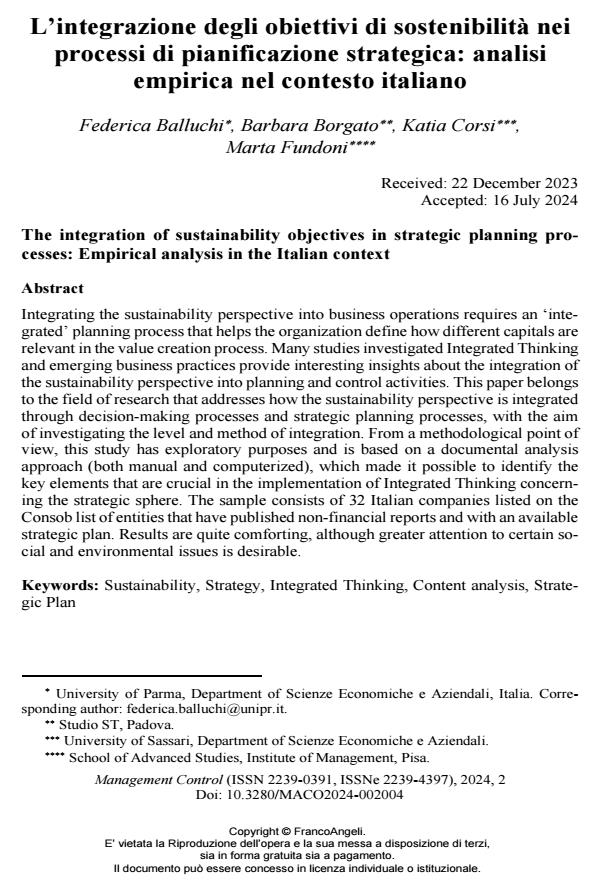L’integrazione degli obiettivi di sostenibilità nei processi di pianificazione strategica: analisi empirica nel contesto italiano
Titolo Rivista MANAGEMENT CONTROL
Autori/Curatori Federica Balluchi, Barbara Borgato, katia Corsi, Marta Fundoni
Anno di pubblicazione 2024 Fascicolo 2024/2
Lingua Italiano Numero pagine 24 P. 65-88 Dimensione file 538 KB
DOI 10.3280/MACO2024-002004
Il DOI è il codice a barre della proprietà intellettuale: per saperne di più
clicca qui
Qui sotto puoi vedere in anteprima la prima pagina di questo articolo.
Se questo articolo ti interessa, lo puoi acquistare (e scaricare in formato pdf) seguendo le facili indicazioni per acquistare il download credit. Acquista Download Credits per scaricare questo Articolo in formato PDF

FrancoAngeli è membro della Publishers International Linking Association, Inc (PILA), associazione indipendente e non profit per facilitare (attraverso i servizi tecnologici implementati da CrossRef.org) l’accesso degli studiosi ai contenuti digitali nelle pubblicazioni professionali e scientifiche.
Integrating the sustainability perspective into business operations requires an ‘integrated’ planning process that helps the organization define how different capitals are relevant in the value creation process. Many studies investigated Integrated Thinking and emerging business practices provide interesting in-sights about the integration of the sustainability perspective into planning and control activities. This paper belongs to the field of research that addresses how the sustainability perspective is integrated through decision-making pro-cesses and strategic planning processes, with the aim of investigating the level and method of integration. From a methodological point of view, this study has exploratory purposes and is based on a documental analysis approach (both manual and computerized), which made it possible to identify the key ele-ments that are crucial in the implementation of Integrated Thinking concerning the strategic sphere. The sample consists of 32 Italian companies listed on the Consob list of entities that have published non-financial reports and with an available strategic plan. Results are quite comforting, although greater atten-tion to certain social and environmental issues is desirable.
Parole chiave:Sustainability, Strategy, Integrated Thinking, Content analysis, Strategic Plan
Federica Balluchi, Barbara Borgato, katia Corsi, Marta Fundoni, L’integrazione degli obiettivi di sostenibilità nei processi di pianificazione strategica: analisi empirica nel contesto italiano in "MANAGEMENT CONTROL" 2/2024, pp 65-88, DOI: 10.3280/MACO2024-002004